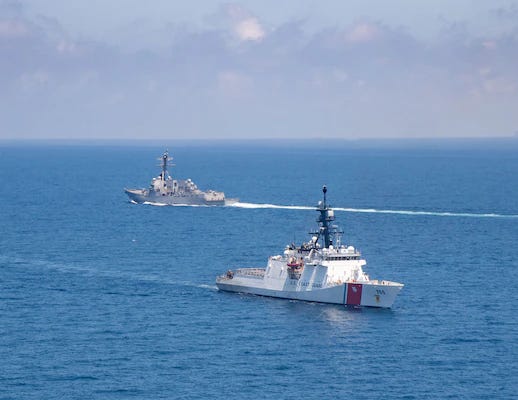When Will China Invade Taiwan?
Your weekly down note
A couple of months ago we spoke with Blake Herzinger about America’s “special” relationship (subscribers only) with Taiwan, which we considered the real China until the 1970s. Blake talked about the ambiguities that keep the PRC guessing as to whether the U.S. would actually come to the island’s rescue in case of an invasion.
He made the argument that the winking relationship between the U.S. and Taiwan is best for everyone, keeping China at bay without the West being overtly hostile.
Of course, the United States has sold weapons to Taiwan for forever, and now we get the revelation that America is training Taiwanese troops at the very moment that China is ratcheting up its threat level toward the island.
China’s forever leader, Xi Jinping, says “reunification” must take place, without giving a precise timeline. Or really any timeline. Taiwan, which has fewer than 24 million people and still calls itself The Republic of China is standing firm—of course.
So, what’s next?
Whatever China wants.
As long as outsiders have done business in China, there have been complaints about ever-shifting sands, of rules and deals that aren’t quite deals and conditions that aren’t conditional. Hong Kong, once the region’s great commercial center and semi-democratic hub, had a deal with China, but was painfully swallowed by it without so much as a burp from the West.
Sure, we all liked Hong Kong the way it was, but was it worth trillions of dollars—not to mention millions of lives—to try to put Mr. Dumpty back together again? Apparently not.
The Opium Wars are now ended, and the victor would have surprised those who fought in them.
Of course, Hong Kong didn’t have its own military and the waves of umbrellas and their echoes apparently hadn’t met China. For some reason, these brave people believed they could challenge Beijing–and Xi–without being crushed.
Taiwan’s major provocation at the moment seems to be that it’s not part of the PRC, sitting democratically off the coast. There’s not a lot Taiwan can do about that, unless the people would rather trade in the local form of freedom for oppression and suspicion by the People’s Republic’s conquering forces.
As is being written all over the place, China seems to be sensing weakness in the United States just as American finally gets around to a “pivot” that has been more like a slow waltz. Afghanistan was lost, though it was never really America’s to have (check out our interview with Mark Galeotti from the week Kabul fell). We’ve walked away from nuclear deals and threatened to walk away from NATO, the ultimate instrument of hegemony. Why? Because of a financial dispute, and an unwillingness to honor commitments to defend allies that have existed for more than 70 years.
All while continuing to bow down to countries like Saudi Arabia, forgetting, or putting aside the killing of Jamal Khashoggi, who enjoyed the less-than-sacred bond of U.S. hospitality.
Why would China think America has Taiwan’s back? Especially given the fact that something less than a handshake binds the superpower and the supplicant together?
So, when will Xi move? When it suits him. When the internal politics is right. When he needs a shot in the arm, an extra boost of populist juice at home. When a little toothless saber rattling from the West raises the level of Chinese nationalism to the fever pitch he needs to avoid popular protests over deep problems in the energy sector, the financial sector, the real estate sector, corruption, and a country turned black by coal dust, and with air you can breath on only the occasional Tuesday.
And what will the West do?
Sanctions?
Sure, but it’s kind of like the dad in the old TV show–the spanking might hurt us more than them.
Head-shaking?
Yes, indeed.
A consignment of Taiwan to history?
Almost certainly.



